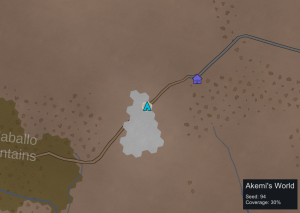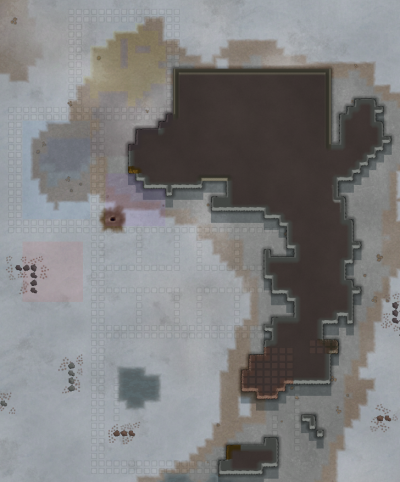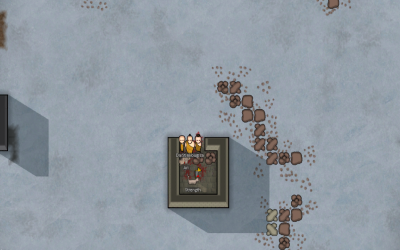Difference between revisions of "User:PigeonGuru/Sandbox"
PigeonGuru (talk | contribs) |
PigeonGuru (talk | contribs) (→Start) |
||
| Line 70: | Line 70: | ||
Surely you do not need to have all five starting colonists with those characteristics, but the more resistant colonists you have the better. | Surely you do not need to have all five starting colonists with those characteristics, but the more resistant colonists you have the better. | ||
| − | == | + | == The first step == |
Once you choose your landing site and colonists you should '''immediately pause the game'''. This gives you time to make decisions. | Once you choose your landing site and colonists you should '''immediately pause the game'''. This gives you time to make decisions. | ||
Revision as of 14:09, 5 September 2018
marmine helmet
template
http://rimworldwiki.com/index.php?title=Template:Nav/guides
http://rimworldwiki.com/wiki/Category:Page_Deletion
save file
C:\Users\%username%\AppData\LocalLow\Ludeon Studios\RimWorld by Ludeon Studios\Saves
°C
old d.tactics is @ ~140,000 views
Ice sheet guide neo
This guide details how to survive in one of the most hostile environments in Rimworld - an ice sheet. We focus on the Lost Tribe start because it is the hardest one to thrive in hostile environments since you got more people to feed and less technology to help you.
Introduction
Ice sheets are the coldest option of cold maps. They have very little animal life and no plants. In fact, you should not expect to find anything more than five snowhares in your start. You should also not expect to see more than one new snowhare every five days and one new polar bear per month.
In addition to that, they do not have any soil available, so anything that you want to grow must be grown on the stony soil patches- that is if you can even grow anything due to the cold. You will struggle a lot until you get a heater and a sun lamp, then you can plant something indoors.
Even the warmest ice sheet it really cold. Their average varies from -20 °C (-4 °F) to -40 °C (-40 °F) and they never have growing periods due to the temperature. You still need to eventually make a freezer though, because the summer temperature is hot enough to spoil your food. Expect to have problems with hypothermia during fall, winter, spring and during cold snaps in summers.
Before the start
You can opt to sweeten your survival experience with a combination of well-picked colonists and landing spot, or choose to go hard and randomise everything. The below assumes you are going for the former.
Landing site
In all maps you should choose your landing site carefully to increases your chances of survival. You want to build a colony in an area with some of the following characteristics:
- Near to tundra (faster moving around)
- Near to a friendly faction base (faster trading)
- Near to a road (faster moving around)
- Without many mountains around (faster moving around)
- With coast (to turn into large growing areas later)
- With caves (early food source)
Ice sheets do not have roads or rivers, but that does not mean you can not settle close to a road. While you should not be surrounded by mountains, the landing site itself can be mountainous.
You do not need to land in an area in all those characteristics, but try to get as many of them as you can.
Starting colonists
Ice sheet is so harsh that you will have to resort to cannibalism, so you may want to have a crew that can tolerate that. That means having one butcher that does not mind butchering people and everyone resistant to mental breaks.
Your butcher should be either Cannibal, Bloodlust or Psychopath.
All your crew should ideally be either Cannibal, Sanguine, Optimist, Iron-Willed, Steadfast or Masochist with scars. Couples also enjoy extra happiness so try to bring couples instead of bachelors, likewise Beautiful and Pretty colonists are also good since they are more likely to fall in love with someone.
Surely you do not need to have all five starting colonists with those characteristics, but the more resistant colonists you have the better.
The first step
Once you choose your landing site and colonists you should immediately pause the game. This gives you time to make decisions.
Base area
You need to choose your base area wisely. It is important to notice that this area does not need to be final, it is just the area where you are more likely to survive the early game.
You want to find an area with the characteristics: near steam geysers, near steel, more growing areas and easily defendable.
More growing areas means more stony patches and an easily defendable area is an area with few entrances where you can lay down traps. Your priority is steam geysers. You have to make the base on top of a steam geyser, or else you will die of hypothermia very fast.
Since you do not have trees, you can not build a big base yet. You can either take a ruin, make a cave or make a small steel base. It all comes down to what you have near the steam geysers. If you have a ruin, take it. If you have a hill, make a cave. If you have none of these, make a small steel base.
Work
Analyze your team, set their priorities. Haul everything towards your chosen ruin and don't use wood at all except for the campfire.
Start mining steel as your main construction material or begin caving in. Play as minimalistic as possible. Gather enough steel to build walls by setting everyone to mine. Use terrain features to get the smallest home you can make besides any nearby structures.
If you have researchers, rush electricity research. You don't need to build a fortress yet, and electricity can be extremely helpful in survival.
Animals & Hunting
Set an animal zone away from your food, you don't want them eating your food as you can't win the game with pets alone. Let them all die of starvation, sorry. Starving pets are excellent lures for predators and while wild animals attack your pets, they won't turn their hunger rage towards you and you can attack them without danger, so long as their target is mid to big size (terriers die in a bear hit or two).
Hunt every time you see meat, as animals have the tendency to leave the map and won't remain roaming around for long. When you find one snowhare, you find the others. Double click on zoomed out view to reduce the time spent on searching.
Always keep an eye on the polar bear food bar- you will need to know when it will strike.
Steam geysers
Now that you've selected somewhere to settle, the next step is to build a decent base.
You should settle on the steam geyser due to the heat source. Living on top of a geyser provides warmth enough up to 10 degree Celsius, just to escape hypothermia. If your colonists complain about "sleeping in the cold", you tell them to man up. The only two reasons to build a campfire are to cook and an emergency extra source of heat when hard snow hits during Winter or a cold snap. Build a wall around it(10x10, the geothermal power plant is 6x6 so between the wall and the steam, the 8x8 line will become a one tile surrounding corridor just enough to place beds around), either by emulating a heater in the center of your room or by pulling a one tile corridor towards your home, even possibly digging a tunnel depending on the terrain altitude map of choice.
Eventually, you should ideally repeat the same geyser-room procedure with other steams in proximity, this is because cold and starvation will not kill you, but mental breaks will. For example, having more than two characters on berserk. Sometimes, two geysers may be close to each other, allowing you to use them at both ends while you build everything else in between. This lucky situation can allow to start building individual rooms for your people and get rid of the barrack penalties.


